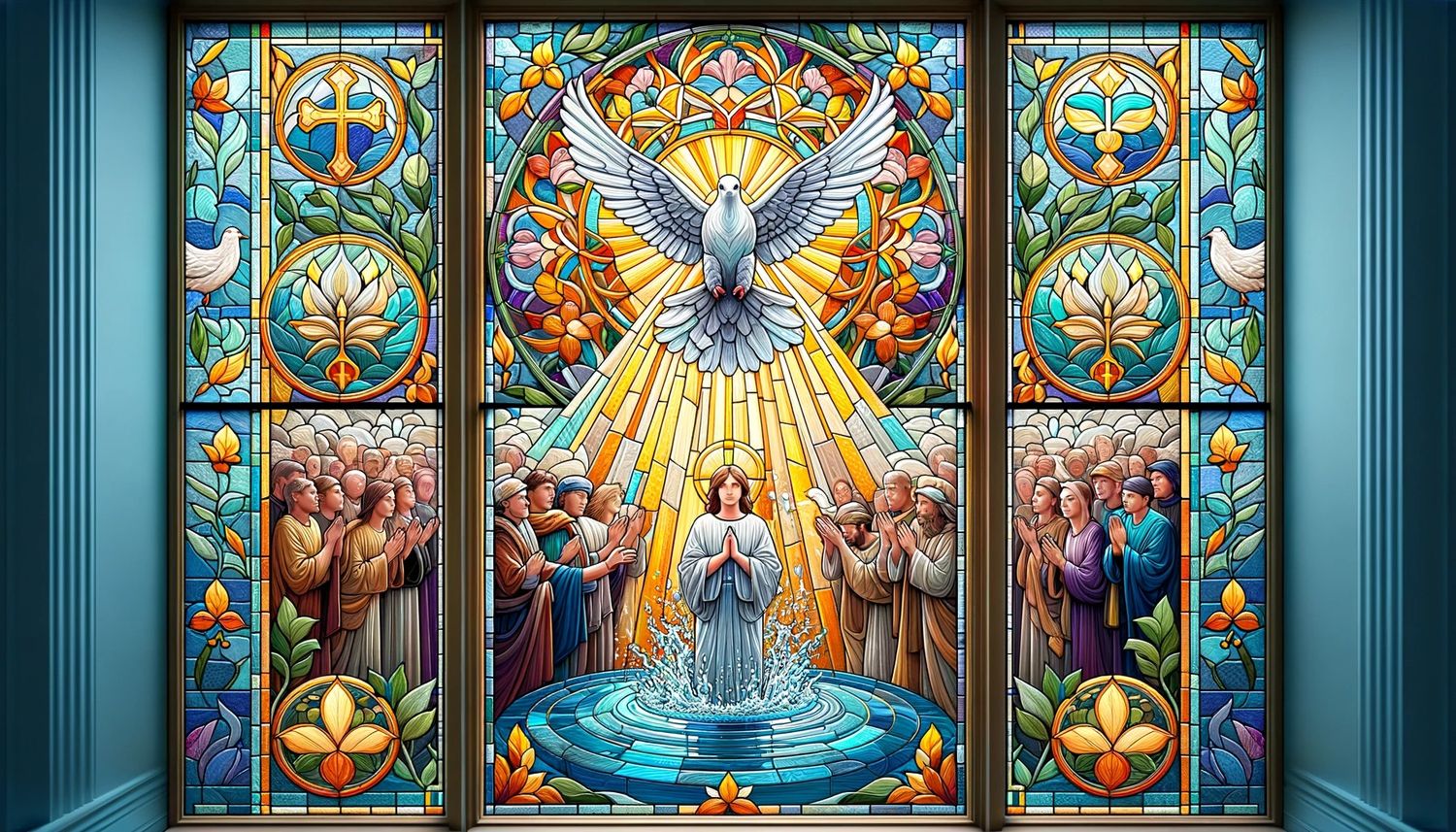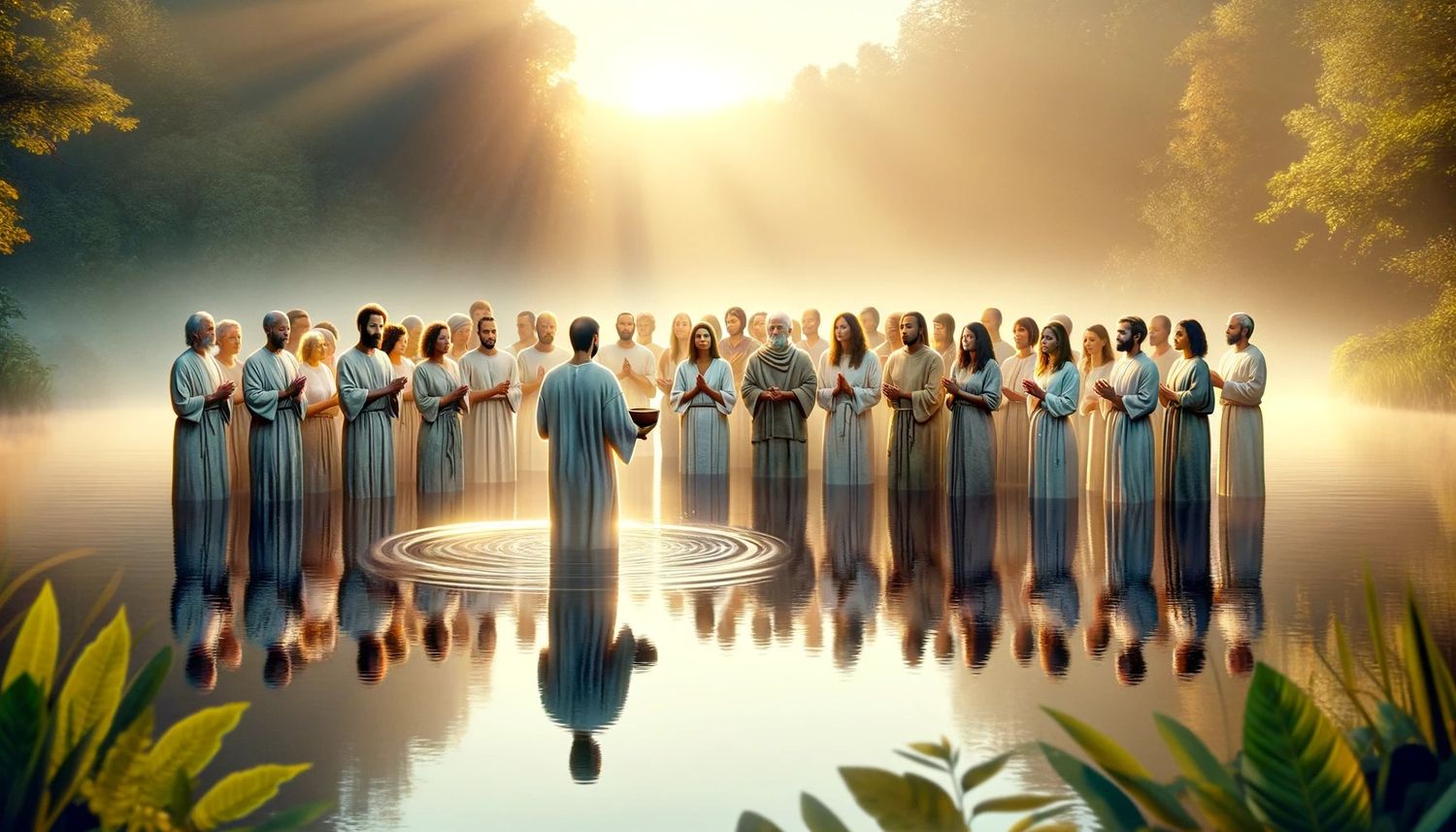Home>Theology and Spirituality>How To Perform A Non-Denominational Baptism


Theology and Spirituality
How To Perform A Non-Denominational Baptism
Published: March 2, 2024
Peter Smith, Editorial Director at Christian.net, combines deep insights into faith, politics, and culture to lead content creation that resonates widely. Awarded for his contributions to religious discourse, he previously headed a major organization for religious communicators, enhancing dialogue on faith's societal impacts.
Learn how to perform a non-denominational baptism with our comprehensive guide. Explore the theology and spirituality behind this sacred ritual.
(Many of the links in this article redirect to a specific reviewed product. Your purchase of these products through affiliate links helps to generate commission for Christian.net, at no extra cost. Learn more)
Table of Contents
Understanding the Purpose of a Non-Denominational Baptism
A non-denominational baptism is a sacred ritual that symbolizes a person's spiritual rebirth and their commitment to a life guided by faith and love. Unlike traditional baptisms that are specific to a particular religious denomination, a non-denominational baptism is inclusive and open to individuals from diverse religious backgrounds or those who do not adhere to any specific faith tradition. The primary purpose of a non-denominational baptism is to provide a meaningful and inclusive ceremony for individuals who seek to publicly declare their dedication to a spiritual life, regardless of their religious affiliations. It serves as a powerful symbol of unity, love, and spiritual growth, emphasizing the universal values of compassion, forgiveness, and inner transformation.
Read more: How To Perform An LDS Baptism
Reasons for Choosing a Non-Denominational Baptism
-
Inclusivity: One of the key reasons for choosing a non-denominational baptism is its inclusive nature. It welcomes individuals from various religious backgrounds, as well as those who may not identify with any specific faith tradition. This inclusivity allows people to come together and celebrate their shared spiritual journey without the constraints of denominational boundaries.
-
Personal Beliefs: Non-denominational baptisms are often chosen by individuals who hold unique or eclectic spiritual beliefs that may not align with a specific religious denomination. It provides them with an opportunity to express their faith in a way that resonates with their personal convictions and values, creating a meaningful and authentic experience.
-
Family Unity: In cases where family members belong to different religious traditions or hold diverse spiritual beliefs, a non-denominational baptism can serve as a unifying ceremony that honors each individual's faith journey while fostering a sense of togetherness and understanding within the family unit.
Embracing Spiritual Diversity
Non-denominational baptisms also play a crucial role in embracing spiritual diversity and fostering a sense of community among individuals with varying beliefs. By transcending the boundaries of specific religious doctrines, this form of baptism encourages individuals to focus on the universal aspects of spirituality, such as love, compassion, and inner peace. It promotes an environment where people can come together to celebrate their shared humanity and the interconnectedness of all beings, regardless of their religious or cultural backgrounds.
In essence, the purpose of a non-denominational baptism extends beyond religious affiliations and dogmas, emphasizing the fundamental principles of love, acceptance, and spiritual growth. It provides a platform for individuals to express their commitment to a life guided by universal values, fostering a sense of unity and understanding within a diverse and interconnected world.
Preparing for a Non-Denominational Baptism
Preparing for a non-denominational baptism involves thoughtful consideration and planning to ensure that the ceremony reflects the individual's spiritual journey and beliefs. Here are essential steps to consider when preparing for a non-denominational baptism:
-
Clarify the Purpose: Before the baptism, it's crucial to clarify the purpose and significance of the ceremony. This involves understanding the individual's personal beliefs, spiritual journey, and the reasons for choosing a non-denominational baptism. It's essential to have open and honest conversations to ensure that the ceremony aligns with the individual's values and intentions.
-
Selecting a Location: Choose a meaningful and serene location for the baptism ceremony. This could be a natural setting, such as a peaceful river, lake, or ocean, or a spiritual space that holds significance for the individual. The chosen location should provide a sense of tranquility and connection to nature or the divine, enhancing the spiritual experience.
-
Involve Loved Ones: Consider involving close friends and family members in the preparation process. Their support and participation can add depth and meaning to the ceremony. Discuss the roles they may play during the baptism, such as reading meaningful passages, offering blessings, or sharing personal reflections.
-
Personalize the Ceremony: Tailor the ceremony to reflect the individual's spiritual journey and beliefs. This may include selecting readings, prayers, or symbolic rituals that hold personal significance. The ceremony should authentically represent the individual's commitment to a life guided by faith, love, and compassion.
-
Seek Guidance if Needed: If the individual is uncertain about the specific elements of the non-denominational baptism, seeking guidance from a spiritual mentor, counselor, or officiant can be beneficial. They can offer support in crafting a meaningful ceremony that aligns with the individual's spiritual path.
-
Prepare Mentally and Emotionally: Encourage the individual to take time for personal reflection and inner preparation leading up to the baptism. This may involve meditation, prayer, or engaging in activities that promote a sense of peace and spiritual readiness.
-
Gather Necessary Items: Depending on the chosen rituals and symbolic elements, gather any necessary items for the ceremony, such as candles, symbolic objects, or ceremonial garments. These items should hold personal significance and contribute to the overall spiritual ambiance of the baptism.
By carefully preparing for a non-denominational baptism, individuals can ensure that the ceremony is a deeply meaningful and authentic expression of their spiritual journey and commitment to a life guided by universal values.
Conducting the Non-Denominational Baptism Ceremony
Conducting a non-denominational baptism ceremony involves creating a sacred and inclusive space that honors the individual's spiritual journey and commitment to a life guided by faith and love. Here are the essential steps to consider when conducting a non-denominational baptism ceremony:
-
Setting the Atmosphere: Begin by setting the atmosphere for the ceremony. This may involve playing soft, contemplative music, creating a sacred altar with symbolic items, and ensuring that the chosen location exudes tranquility and reverence.
-
Opening Words: The ceremony can commence with opening words that acknowledge the significance of the occasion and the individual's spiritual journey. This may include a brief reflection on the universal values of love, compassion, and inner transformation.
-
Reading of Meaningful Passages: Select readings or passages from spiritual texts, poetry, or philosophical writings that resonate with the individual's beliefs and values. These readings can offer inspiration, wisdom, and a sense of connection to the divine or the universal spirit.
-
Blessings and Affirmations: Invite friends and family members to offer blessings, well wishes, or affirmations that honor the individual's commitment to a life guided by faith and love. This can be a deeply moving and personal aspect of the ceremony, fostering a sense of support and unity.
-
Symbolic Rituals: Incorporate symbolic rituals that hold personal significance for the individual. This may include the pouring of water as a symbol of spiritual cleansing and rebirth, the lighting of candles to represent inner illumination, or the exchange of meaningful gifts that symbolize the individual's spiritual journey.
-
Declaration of Commitment: The individual can express their commitment to a life guided by universal values, love, and compassion. This declaration can be a powerful and affirming moment, emphasizing the significance of the baptism in their spiritual journey.
-
Community Participation: Encourage community participation by inviting attendees to share their reflections, blessings, or words of support. This fosters a sense of communal celebration and unity, emphasizing the interconnectedness of all individuals on their spiritual paths.
-
Closing Words and Blessings: Conclude the ceremony with closing words that express gratitude, blessings, and well wishes for the individual's continued spiritual growth and journey. This can be a poignant and uplifting way to bring the ceremony to a meaningful close.
By conducting a non-denominational baptism ceremony with care and intention, individuals can create a deeply meaningful and inclusive experience that celebrates their spiritual rebirth and commitment to a life guided by universal values.
Read more: Does It Matter Who Performs A Baptism
Exploring the Symbolism of a Non-Denominational Baptism
The symbolism of a non-denominational baptism encompasses profound spiritual significance, reflecting the individual's journey of inner transformation, renewal, and commitment to universal values. Each symbolic element incorporated into the baptism ceremony holds deep meaning and serves as a powerful representation of the individual's spiritual rebirth and dedication to a life guided by faith and love.
Water as a Symbol of Cleansing and Rebirth
The use of water in a non-denominational baptism symbolizes spiritual cleansing and rebirth. As the individual is immersed in or sprinkled with water, it represents the washing away of past transgressions, impurities, and the emergence of a renewed spirit. This act signifies a commitment to leaving behind old ways and embracing a fresh start guided by spiritual purity and inner transformation.
Lighting of Candles for Inner Illumination
The lighting of candles during a non-denominational baptism serves as a symbol of inner illumination and spiritual awakening. The flickering flame represents the light of divine wisdom, illuminating the individual's path and guiding them towards a life filled with love, compassion, and understanding. It signifies the awakening of the inner spirit and the pursuit of enlightenment on their spiritual journey.
Exchange of Meaningful Gifts
The exchange of meaningful gifts during a non-denominational baptism holds symbolic significance, representing the offering of blessings, support, and encouragement on the individual's spiritual path. These gifts may carry personal or spiritual significance, serving as tangible reminders of the commitment to a life guided by universal values. The act of exchanging gifts fosters a sense of unity and communal support, emphasizing the interconnectedness of individuals on their spiritual journeys.
Read more: Who Created The Baptist Denomination
Embracing Nature and the Divine
Choosing natural settings for the non-denominational baptism, such as rivers, lakes, or oceans, symbolizes the connection to the elements of nature and the divine. The serene and tranquil environment reflects the harmony and interconnectedness of all living beings, emphasizing the universal presence of the divine in the natural world. It serves as a powerful reminder of the spiritual unity that transcends individual beliefs and traditions.
Declaration of Commitment to Universal Values
The individual's declaration of commitment to a life guided by universal values, love, and compassion serves as the central and most profound symbol of a non-denominational baptism. This declaration represents a conscious choice to embody the principles of kindness, empathy, and spiritual growth, transcending the boundaries of religious denominations and embracing the shared humanity of all individuals.
In essence, the symbolism of a non-denominational baptism encapsulates the universal themes of spiritual renewal, inner illumination, communal support, and the interconnectedness of all beings. Each symbolic element woven into the ceremony contributes to a deeply meaningful and inclusive experience, reflecting the individual's dedication to a life guided by faith, love, and universal values.
Addressing Common Questions and Concerns about Non-Denominational Baptism
1. Is a non-denominational baptism recognized by specific religious institutions?
Non-denominational baptisms may not be officially recognized by specific religious institutions due to their inclusive and non-affiliated nature. However, the significance of the ceremony lies in its personal and spiritual meaning to the individual and their community, rather than institutional recognition.
Read more: What Denomination Is The National Cathedral
2. Can individuals of any age undergo a non-denominational baptism?
Yes, non-denominational baptisms are inclusive and open to individuals of any age, including infants, children, and adults. The decision to undergo a non-denominational baptism is based on the individual's personal beliefs and spiritual journey, regardless of their age.
3. How does a non-denominational baptism differ from a traditional baptism?
Non-denominational baptisms differ from traditional baptisms in that they are not tied to a specific religious denomination or doctrine. They are inclusive and open to individuals from diverse religious backgrounds or those who do not adhere to any specific faith tradition, emphasizing universal spiritual values.
4. Can non-religious individuals participate in a non-denominational baptism?
Absolutely, non-denominational baptisms are designed to be inclusive and welcoming to individuals who may not identify with any specific religious tradition. The ceremony focuses on universal spiritual values and personal beliefs, allowing non-religious individuals to participate in a meaningful and authentic way.
5. What role do family and friends play in a non-denominational baptism?
Family and friends can play significant roles in a non-denominational baptism, such as offering blessings, sharing reflections, or participating in symbolic rituals. Their involvement adds depth and meaning to the ceremony, fostering a sense of community and support for the individual undergoing the baptism.
Read more: What Denomination Is Tromsø Cathedral
6. How can one find an officiant for a non-denominational baptism?
Finding an officiant for a non-denominational baptism can involve seeking guidance from spiritual mentors, counselors, or individuals who specialize in non-denominational ceremonies. It's essential to find an officiant who understands and respects the individual's spiritual journey and can help craft a meaningful and inclusive ceremony.
7. Is a non-denominational baptism legally recognized?
The legal recognition of a non-denominational baptism may vary depending on local laws and regulations. In some regions, non-denominational baptisms may hold legal significance, while in others, they may be primarily recognized as a spiritual or personal ceremony. It's important to consider the legal implications based on the specific location.
8. Can individuals who have undergone traditional baptisms also participate in a non-denominational baptism?
Yes, individuals who have undergone traditional baptisms in specific religious denominations can still participate in a non-denominational baptism. The ceremony serves as a personal and spiritual expression of their ongoing faith journey and commitment to universal values, complementing their previous religious experiences.
9. What are the key elements that make a non-denominational baptism meaningful?
The key elements that make a non-denominational baptism meaningful include personal reflection, community involvement, symbolic rituals, and a declaration of commitment to universal values. These elements contribute to a deeply personal and inclusive ceremony that honors the individual's spiritual journey and beliefs.
Read more: What Was The First Baptist Denomination
10. How can individuals ensure that their non-denominational baptism aligns with their personal beliefs?
Individuals can ensure that their non-denominational baptism aligns with their personal beliefs by actively participating in the planning process. This may involve selecting meaningful readings, rituals, and symbolic elements that resonate with their spiritual journey, ensuring that the ceremony authentically reflects their commitment to a life guided by faith and love.










